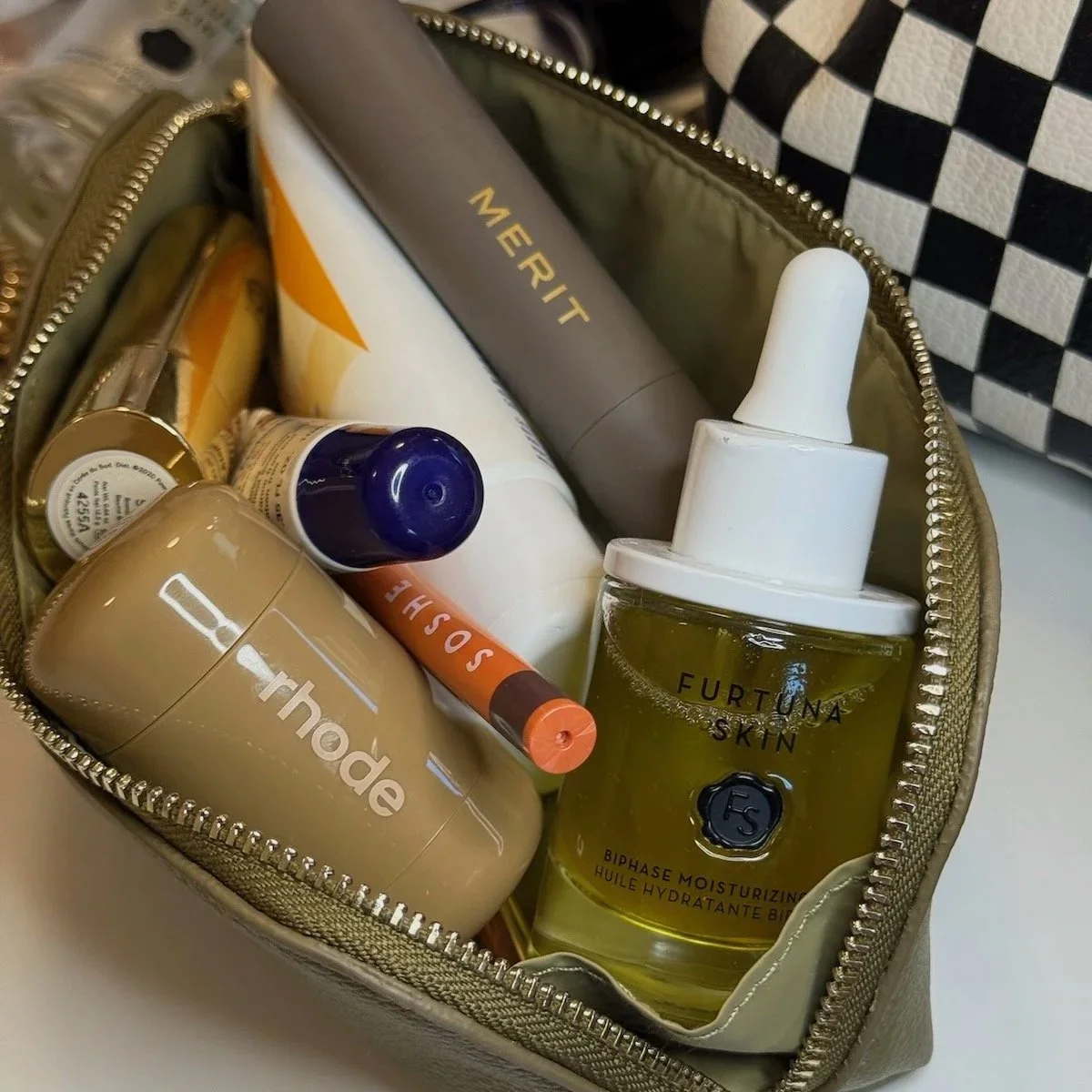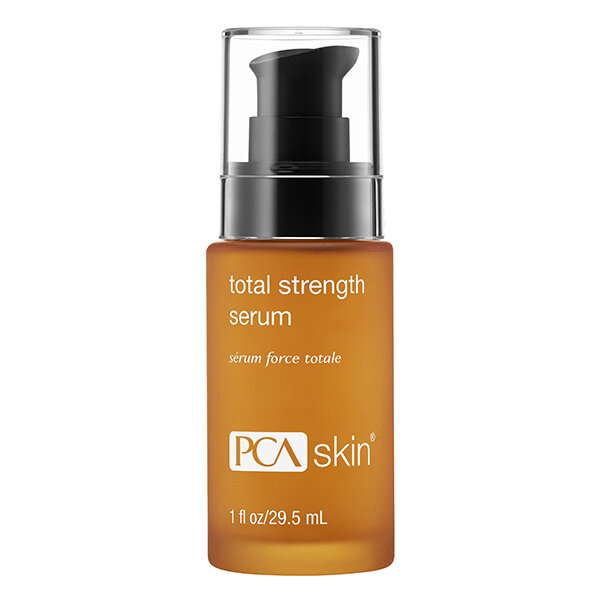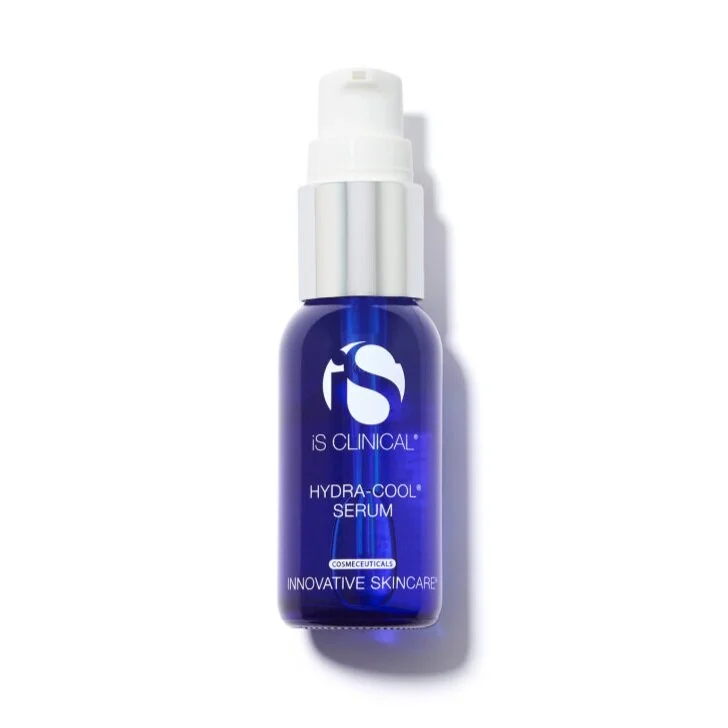What The Hell Is A Serum, And Do I Actually Need One?
by Marissa Pomerance
Apparently, 87% of women are confused by skincare.
And the word “serum” is confounding enough to make even the most confident, put-together, grown woman break out into a light rash in the Sephora aisle.
So are serums legit? Or are they just another “essential” product we’re all coerced into thinking we need in order to be youthful? And if they’re legit, which of the 87,346 serums should I buy?
Welp, here we go.
Serums are “power products.”
Simply put, serums are highly concentrated treatments that powerfully target different skin concerns, containing a mix of potent, active ingredients. Our favorite Aesthetician-in-Chief, Candace Marino, calls them "power products." They generally come in “a liquid to gel-like texture,” and consist of “high concentrations of active ingredients in smaller molecules that are able to penetrate the skin and go to work at a deeper level where they can create change.”
They come in all sorts of formulas and categories, and here are just a few different types:
Hydrating
Exfoliating
Anti-Acne
Brightening
Anti-Aging
Serums aren’t total bullshit.
Like anything else, some serums are more effective than others, but generally, serums are not total bullshit. There have been tons of clinical trials demonstrating their efficacy for everything from fine lines to hydration and sun damage. And dermatologists, like Dr. Abigail Waldman, instructor of dermatology at Harvard Medical School, highly recommend them as effective treatments, especially to address anti-aging concerns.
And while you don’t have to spend hundreds of dollars to find a serum that works, you need to find serums that use quality ingredients. Candace believes that “medical grade serums are your best skincare investment because these companies spend their dollars on quality ingredients, research, formulation and clinical trials, while mass-produced brands spend their money on marketing and have less quality control.”
The quality of ingredients matters, so if you’re new to serums and not sure what to spend your money on, we recommend this:
Start with brands that validate their ingredients and products with clinical studies, like iS Clinical, PCA Skin, and SkinCeuticals.
Take full advantage of sampling—ask sales associates at Sephora, the department store, or your local beauty store if you can take home a sample of a few different serums, that way you can test them before you commit to buying. But don’t expect magic after two nights. Try to be sure you don’t have a bad reaction, and that the product agrees with your skin.
Ask your aesthetician/dermatologist for recommendations. They usually know the best, science-backed skincare on the market, and they’ll know what works well for your price point.
Serums are easier than we think to use.
Targeted skincare treatments that will clear my pores and shrink my wrinkles and hydrate and soothe and brighten? Done. Yet, knowing how and when to apply a serum can feel perplexing, especially when most of us can barely remember to remove makeup or put on sunscreen.
But, it’s actually pretty simple; serums go after cleansing and toning/spritzing, and before moisturizer, SPF, and/or a hydrating oil. An easy, serum-inclusive skincare routine might look like this:
Serum
SPF (only during the day)
Serums and oils are NOT the same. WHY IS THIS SO CONFUSING?
If you’ve ever even considered buying a serum, you’ve likely stumbled across facial oils only to wonder if these are one in the same. Are oils serums? Are serums oils? Can we settle this debate once and for all? And how do we use each?
Generally speaking, serums target specific conditions on a cellular level, making them a treatment step, while oils are best suited for hydration. “Oils and serums are not the same,” Candace clarifies, finally putting an end to this madness. “Oils are much larger molecules, meaning they are serving the outermost layers of the skin, which makes them more suitable as a moisturizing step. Serums are smaller molecules which are able to penetrate deeper, making them the ‘worker’ ingredient in your skincare regime.” So, always use your serum before your moisturizer, and never as a replacement. Oils go after your serum or moisturizer, and can be used as your moisturizer.
But here’s the real difference; serums are about efficacy, and oils are about the experience. Of course, you still want facial oils that repair and hydrate. But if you want a luxe, pampering experience that makes you feel like you’re smearing a French garden all over our face, then you should look for that experience from an oil, not a serum. Oils are to have a moment, serums are to do a job, and often, the best serums usually don’t soothe or smell delicious or pamper.
Here are the serums you should buy, and exactly when to use them.
We already know that serums can come in infinite varieties. But let’s start here: day and night, because then you can seek out your serums already knowing how and when you’re going to use them, removing at least one layer of guesswork.
1. For AM: Candace’s Favorite Vitamin C Serum
What To Buy: Klur’s Brilliant Light Serum
Typically, daytime serums are lightweight, hydrating, and protecting. You want to be able to elegantly layer them under makeup without slippage and meltage, so they shouldn’t be too heavy or oily. Day serums are meant to protect your skin from environmental damage using ingredients like antioxidants (Vitamins C & E, for example), and peptides.
Antioxidant serums, like this one, protect the skin by counteracting free radicals, and ward off wrinkles, fine lines, and dark spots.
This is Candace’s favorite Vitamin C serum because it’s “packed with additional antioxidants such as Gotu Kola Extract, ferulic acid, as well as Superoxide Dismutase which is an enzyme known for its free radical breakdown powers.”
3. For AM/PM: A Potent Peptide Serum
What To Buy: PCA Skin Total Strength Serum
Peptides are proteins that help build collagen and elastin fibers, so peptide serums aim to increase collagen and smooth fine lines and wrinkles. But peptides can also protect against free radicals and environmental damage.
This multi-peptide serum has hyaluronic acid and epidermal growth factor to stimulates collagen and helps reduce fine lines (in addition to protecting the skin). It’s lightweight and no-fuss, and can be used day or night, under moisturizer, and layered with other serums.
4. For AM/PM: Candace’s Favorite Hydrating Serum
What To Buy: iS Clinical HydraCool Serum
Sometimes, your emollient-rich moisturizer and thick facial oil aren’t doing the trick, in which case you need a highly active serum to bind water to your skin. We recommend looking for formulas with ultra-hydrating ingredients like hyaluronic acid and squalane, and use them either day or night (under moisturizer), because they’re so versatile.
For some extreme hydration, Candace recommends this serum, which she describes as “a big drink of water for the skin.” It uses hyaluronic acid, which is known to hold 1000x its weight in water, and it works for every skin type.
5. For AM/PM: One Great Serum for Hydration and Radiance
What To Buy: PCA Skin’s Hyaluronic Acid Boosting Serum
While this serum has a handful of powerful active ingredients like niacinamide and hydrolyzed hyaluronic acid, what really packs its unique punch is its HA-pro complex—their propriety blend that stimulates your own production of hyaluronic acid, something that slows down wildly as we age, and is one of the reasons even the moistest of moisturizers often can’t tackle our dry skin.
You will notice an immediate difference in your skin. It will feel extremely hydrated in the morning. It will have a radiance that your dumb husband will probably even comment on. It will make you feel like, finally you spent money on something and actually can see that it’s working.
Use this serum morning and night, UNDER your moisturizer.
6. For PM: An Extra-Strength Retinol Loved By Candace
What To Buy: AlphaRet Overnight Cream from Skinbetter Science
Retinols are the multi-tasking best friends of aestheticians and dermatologists everywhere. Retinols encourage cellular turnover and collagen production, and retinol serums are potent heavy hitters, treating everything from acne to wrinkles to scarring to dark spots.
We know, it says “cream” in the name, which is confusing, but it’s a serum. Candace loves this retinol serum because it “improves skin texture and color while still lightly hydrating. The formula also delivers these potent ingredients to the skin with little to no irritation, meaning you aren't going through a crazy adjustment phase as you probably have when trying a prescription or OTC retinol product.”
7. For PM: A Gentle Retinol For Beginners
What To Buy: PCA Skin’s Retinol Treatment For Sensitive Skin
Yes, this is our third pick from PCA Skin. No, they are…not cheap.
But we are nothing if not suckers for instant gratification, and this retinol serum gives INSTANT results, with little to no irritation.
8. For PM: Candace’s Favorite Exfoliating Serum
What To Buy: iS Clinical Active Serum
Exfoliating and brightening serums use skin-safe acids to generate cell turnover and slough off dead skin cells, revealing brighter, newer skin underneath. These also work well for acne, aging, scarring, and dark spots.
Another Candace favorite, this serum uses naturally derived exfoliants to “brighten the skin, improve texture, improve acne and congestion, and combat lines and wrinkles.” Candace believes that if you only have the patience to pick one, do-it-all serum, this is it.
9. For PM: A Budget Exfoliating Serum
What To Buy: Maelove’s Super Smooth Resurfacing Serum
Like their Glowmaker, Maelove’s Super Smooth rings in at a well-priced $28, and uses a blend of acids (lactic, tartaric, glycolic and salicylic) to brighten, exfoliate, and smooth texture.
It packs a punch, so we recommend using at night and following up with a very hydrating moisturizer.
We know. That was still a lot of information. But here’s what we recommend; for each time of day, pick ONE serum that you think your skin needs the most. Start there. See how it goes.
If you become a serum addict, then by all means, please come back for more. We’ll be here.
Marissa Pomerance is the Managing Editor of The Candidly. She’s a Los Angeles native and lover of all things food, style, beauty, and wellness. You can find more of her articles here.
At The Candidly, we recommend things we truly love, and that we think you’ll love. Sometimes, our friends recommend their favorite things, too. All details reflect the price and availability of products at the time of publication. If you buy something we link to, The Candidly may earn a commission.
We have to eat.
This article is for informational purposes only. It is not intended to be used in place of professional advice, medical treatment, or professional care in any way. This article is not intended to be and should not be a substitute for professional care, advice or treatment. Please consult with your physician or healthcare provider before changing any health regimen. This article is not intended to diagnose, treat, or prevent disease of any kind. Read our Terms & Conditions and Privacy Policy.



















